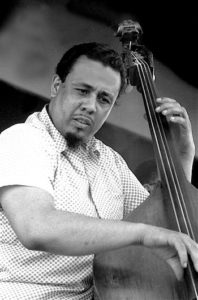
Charles Mingus
This date marks the birth of Charles Mingus in 1922. He was a Black jazz bassist, composer, and band leader.
Born in Nogales, Arizona, Mingus was raised in the Watts neighborhood of Los Angeles. He found work early in his bass-playing career with Louis Armstrong, Lionel Hampton, and Red Callender.
After moving to New York in 1951, he gigged with the jazz giants of the day, including Duke Ellington and Charlie Parker, as well as young musicians such as Miles Davis and Max Roach. With the latter, Mingus formed his own record company, Debut, in 1952 and later co-founded the Jazz Composers’ Workshop, which evolved into Mingus’ musical think tank, the Jazz Workshop. The contradictory, volatile, erratic, sensitive, and ecstatic Mingus was a phenomenal composer and recording artist.
During the ‘50s alone, in addition to his Debut recordings, he released albums on Columbia and Atlantic; he even managed to deliver the goods for such small labels as Bethlehem, Savoy, and Candid. As a result, there is an enormous amount of Mingus’ musical vision; a hot-blooded affection for the blues, a fevered craving for gospel testifying, an intrigued interest in Mexican music, an ardent love of classical, from Debussy to Bartok, and a reverent passion for the entirety of the jazz tradition. Mingus integrated a legion of styles into non-clichéd, perfectly balanced music.
He was also an uncompromising general regarding marshaling and leading his crack troops. He called for his bandmates to be filled with the same Holy Spirit he was consumed by and driven by, the same fiery devotion he practiced. His compelling music probed the depths of anguish and soared into the stratospheric highlands of joy. A person living with Lou Gehrig’s disease, Mingus wrote music until his final days in 1979, developing new material by dictating melody lines into a tape recorder when he could no longer play the piano. He was a visionary to the end, committed to his music.
In 1972, in the original liner notes of Let My Children Hear Music, he wrote, “I say, let my children have music. For God’s sake, rid this society of some of the noise so that those who have ears will be able to use them someplace listening to good music.” That was Mingus’ mission in life. During his lifetime, Charles Mingus was widely recognized in jazz circles as one of music’s most talented contributors. After his death, his brilliance as an indomitable creative force began to be fully realized. After his death on January 5, 1979, his legacy continued with Mingus Dynasty and the Mingus Big Band, led by his widow, Sue.
All That Jazz The Illustrated Story of Jazz Music
General Editor: Ronald Atkins
Copyright 1996, Carlton Books Limited
ISBN 0-76519-953-X